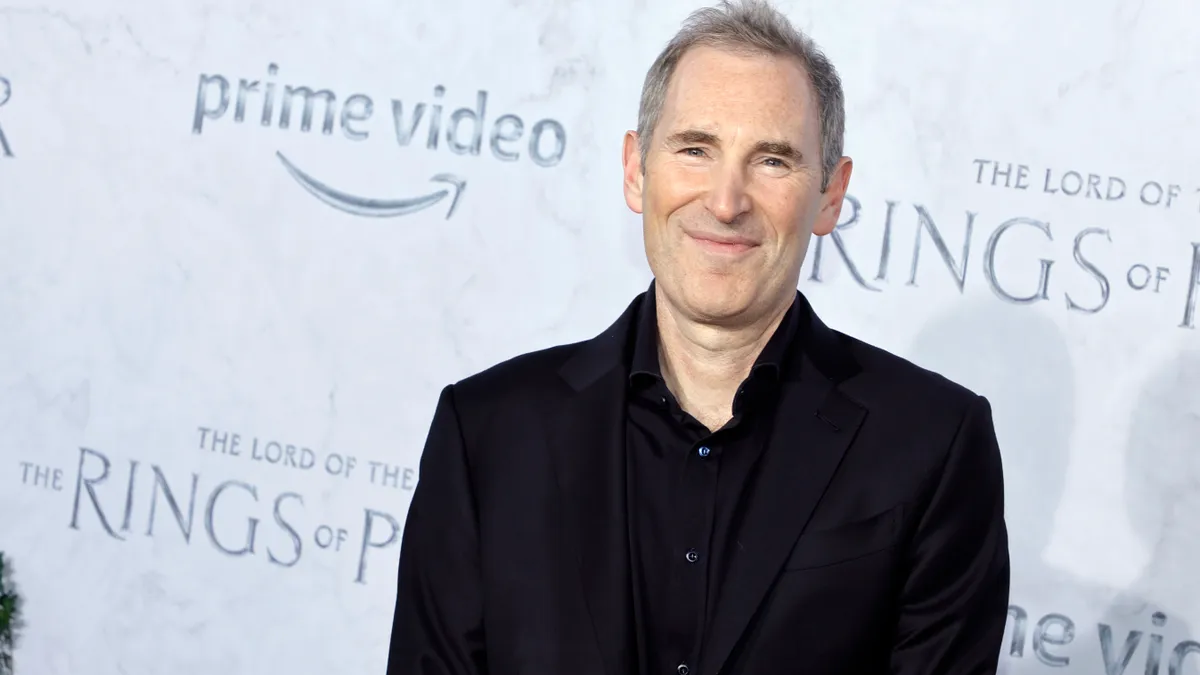Dive Brief:
-
Amazon CEO Andy Jassy must answer to the National Labor Relations Board for assertions made during media interviews earlier this year that joining a union would put employees at a disadvantage at the company and that their relationships with supervisors would be better if they’re not part of a union.
-
In doing so, Jassy “has been interfering with, restraining, and coercing employees in the exercise of the rights guaranteed” under federal labor law, according to an Oct. 25 letter to Jassy from NLRB Regional Director Ronald Hooks. A hearing on the matter, which is based on a complaint from the Amazon Labor Union, is scheduled for Feb. 7.
-
Amazon spokesperson Kelly Nantel defended Jassy’s comments as a lawful explanation of the company’s views on unions. “These allegations are completely without merit, and the comments in question are clearly protected by express language of the National Labor Relations Act and decades of NLRB precedent,” Nantel said in an emailed statement.
Dive Insight:
The charges outlined in the NLRB complaint cite statements Jassy made during interviews with CNBC and Bloomberg.
In an April interview with CNBC, he said that if employees were represented by a union they would be less empowered in the workplace, that it would be more difficult for them to have direct relationships with management and that things would be done less quickly and more bureaucratically, according to the agency’s letter. And in his June interview with Bloomberg, he made similar comments and also stated that “employees are better off without a union,” per the letter.
Amazon characterizes those remarks as benign.
“The comments lawfully explain Amazon’s views on unionization and the way it could affect the ability of our employees to deal directly with their managers, and they began with a clear recognition of our employees’ right to organize and in no way contained threats of reprisal,” Amazon’s Nantel said in the statement. “We believe our employees, their families, and other stakeholders benefit from a full understanding of the facts on important topics like this. We’re committed to ensuring everyone understands our perspective and to explaining it respectfully and transparently.”
But Jassy made them in what is a new era for labor organization, with rising approval from Americans, especially younger ones, and enforcement from an NLRB newly emboldened by the Biden administration. The current stance of the NLRB and the high-profile nature of union efforts at big chains like Starbucks and at Amazon itself make it more likely that unions will file complaints like this, triggering the kind of actions that Jassy now faces, according to John Logan, professor at the Lam Family College of Business at San Francisco State University and an expert in labor and anti-labor activities.
There’s a strong case that Jassy’s comments could be construed by workers as a threat to their job situation, just as they would be if a direct supervisor made them on the warehouse floor, Logan said by phone.
“There's no question that Jassy and [Starbucks CEO Howard] Shultz are trying to send a message to employees that either unionization is futile and that we’ll never give up our opposition to the union — things that clearly could constitute allegations of unlawful coercion, and that if said face to face to an employee in the context of an organizing campaign would be unlawful,” Logan said. “Whether they're said by the CEO in the context of a speech or interview, or if they're said by a district manager or warehouse manager in the context of a union campaign, you can make a very strong argument that, either way, the workers will hear these comments or they will get to know about them, and that potentially will have a very chilling impact on the union drive.”
But Jonathan Hyman, an attorney at law firm Wickens Herzer Panza who specializes in management-side labor and employment law, sees it as a difficult case for the union to make. Like Amazon, he sees Jassy’s comments as general statements about how the employer-employee relationship could change if a workplace unionizes. And the union must prove that Jassy intended to threaten or intimidate employees, he said by email.
“I’ll note, however, that NLRB General Counsel Jennifer Abruzzo has made statements about ‘direct relationships’ between employees and management being on her kill list,” he said. “All things being equal, I think Amazon has the better of these arguments, but with this NLRB, all bets are off.”














